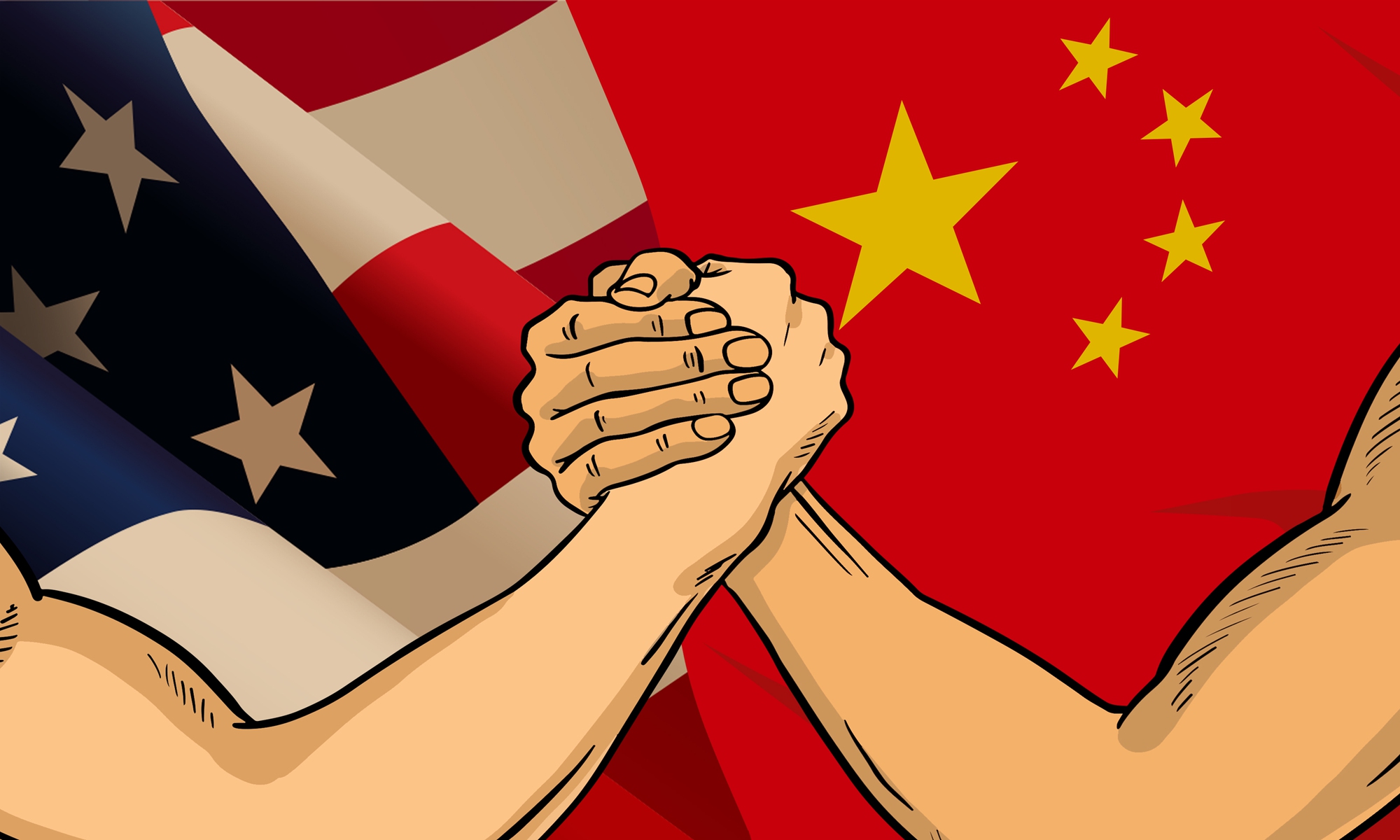
Photo: GT
Editor's Note:The newly released Asia Power Index by the Sydney-based Lowy Institute shows that the US remains the most powerful country in the Indo-Pacific region but registered the largest fall in relative power of any regional country in 2020, while China comes in as the second most powerful country in the region. China has also lost points in diplomatic influence, but it is holding ground in its overall power, according to the report. To better comprehend the report and understand the implications of the US decline and China's rise to the geopolitical landscape in Asia, Global Times (GT) reporter Wang Wenwen talked to Hervé Lemahieu (Lemahieu), director of the Asia Power Index project at Lowy.
GT: You said the game changer this year is the pandemic. Will the pandemic make the trend of the US decline and China's rise sustain?
Lemahieu: Last year, our Index showed that the gap between China and the US was being narrowed because of China's rise. US power was stable. This year, the gap between the US and China has narrowed further, because the US has lost a degree of prestige from its handling of the COVID-19 pandemic. China's diplomatic standing has also diminished but its comprehensive power is stable. It remains to be seen whether this narrowing power differential can be sustained over time, because a lot of the reasons for the decline in US standing in Asia come down to a loss of reputation and prestige which can be reversed. A new administration in the US, for example, could rapidly change the narrative, particularly if it seeks to proactively mend ties in Asia and promote a more multilateral form of US leadership. So a lot of the factors for the US decline in Asia come down to political choices rather than structural forces. At the same time, we see China's deteriorating ties with a number of countries, including India and Australia. That is a big problem for China's ascendancy but is also theoretically reversible based on Beijing's choices. For the moment, both superpowers are struggling to get their messages across to the region.
In terms of the longer term, it is perfectly possible to envisage a future where China levels with the US in the Asia-Pacific region, but who comes up on top will really depend on different scenarios, including economic recoveries, a race for technological superiority, and the use of network power. Both the US and China have to invest in their partnerships with other countries in order to grow their influence. And the superpower with the best networks in the region, whether economic, diplomatic, or defense-based, will come up on top. The most likely scenario is that neither the US nor China will have sufficient margins to wield undisputed primacy over the region. That is to say, there is not going to be a unipolar Asian order, either US- or China-led, because both sides have pronounced strengths and weaknesses. And that means the balance of power in the region is really influx. In that situation, other players - much smaller than the US and China - will become more consequential and may constitute the marginal difference in the overall balance of power.
GT: This year's Index predicted that China will catch up with the US in 2030. We have already seen the US suppression of China in all fronts in a bid to slow the pace of China's rise. How will this prediction play out?
Lemahieu: I must clarify that statement because it is very hard to predict the future. So we don't go so far as to say with 100-percent certainty that China will prevail over the US. But what we're saying is that it's possible that by the end of this decade, China will have leveled with the US. It may even marginally surpass the US. But that will depend on many things happening which we cannot predict at this point. The bottom line though, as I think, is that decoupling between the world's two largest economies will not be decisive in US-China competition. It will hurt China to an extent, but globalization will continue to involve both players even if they do less with each other. And the real challenge for both the US and China is working on making their economies as dynamic as possible. It will be the country that prevails in the technological arms race that is in a better position to outcompete the other. So that is what will be more important than any kind of new cold war strategy. I would also assume that if we see a change in the administration from the US next year, those policies will change a little bit. So I would expect that US-China competition will continue, but maybe not in the same framework as we've seen take place under the Trump administration. We have to wait and see about that.
Right now, it will be very hard for China to replace the US as a security guarantor for the region, something that China needs to work on in the future if it really does want to replace the US in the region. Beijing will also have to be very careful to manage the consequences of the ageing of its population. A smaller working-age population presages challenges to come in the way that we have seen for other East Asian countries such as Japan.
GT: What will the changing strength between China and the US bring to Asia?
Lemahieu: I think Asia's future will be poorer, more disorderly, and dangerous. The increase in great power rivalry between the US and China is forcing uncomfortable choices from smaller players. All countries must face the consequences of great power politics, while the reactions of and different decisions made by countries will vary, depending on their circumstances and choice of alignment or hedging strategies. Some in Southeast Asia will remain quite nonaligned, and they will try to hedge. They will try to play off the US and China against each other to advance their interests and strengthen their agency. Other countries such as India and Vietnam are looking to more closely associate themselves with the US. But again, there are limits to how far they will go. US allies like Australia or Japan will want to manage their relations with China, uphold their sovereignty and the rules-based order - but they don't necessarily want to sever their relations with China completely if they can avoid it. And that is a key difference with the US policy toward China at the moment, as this current administration is really pushing for a far more confrontational stance and a general decoupling with China in terms of economic ties.
For US allies, it is about aligning with the US in certain matters, including building a kind of military counterweight to the rise of China's military capability, but not across the board. Wholesale decoupling is not something that any major Asian economy wants to pursue at the moment.
GT: India has lost its "major power" status in the report. Do you think India's decline will give it less leverage in its power games with China and the US?
Lemahieu: India and a lot of other countries, including Australia, hope that one day India will have the economic power to be able to rival China. And certainly in population terms, it is the only country that can match China. But in economic terms, it still lags far behind. And India's rise as a great power or a third superpower in our region has been delayed because of the economic fallout from the pandemic.
But what you cannot discount from New Delhi is its political will and strategic ambition to play a larger role in our region. This is where we have seen some real changes for India. Historically, India has been very nonaligned. And in fact, it still has a very good relationship with Russia, which makes things a little bit awkward for Russia because it has a good relationship with China as well.
But for India, the degree of rapprochement with the US is quite new and has been a very conscious strategic choice. And it is quite remarkable given how India has historically been very nonaligned, and quite wary of becoming too involved with the US. So the fact that it has evolved in that direction suggests to me that India has the ambition to balance China's rise, maybe not by itself but certainly in concert with other powers, including Japan and the US. I don't think it could do so unilaterally. And that is something that will continue to be a problem for China, even if India is smaller economically than what it could have been without the pandemic.
GT: China-Australia relations have come to decades' low. What factors will affect China-Australia relations in the future? And how will Australia formulate its next steps in the Indo-Pacific?
Lemahieu: We've reached a very difficult point in the bilateral relationship with China. We have seen a near complete breakdown in diplomatic ties with Beijing, but it is still a very important economic relationship. The comprehensive strategic partnership is still in force. But there is growing misalignments between the two.
Australia must work on several approaches at once. Obviously, we have a very important relationship with the US, and that will continue to be the case. Irrespective of who wins the election in the US, the security alliance will continue to hold. But Australia is also doing much more in terms of reaching out to non-allied strategic partners, including Vietnam, India, Japan, and Indonesia. And that is becoming much more important for Australia because it needs to work on several scenarios. One scenario is one in which the US continues to be actively involved in Asia. And another scenario is one where the US may no longer be the dominant power in Asia, and then the number and depth of partnerships with other countries, especially like-minded middle powers, must start to matter more.
Now, in terms of how this affects the Australia-China relationship, it's too difficult to tell because it's not always the choice of Australia - it also depends on goodwill from China and the extent to which Beijing is likely to want to engage with Australia and repair ties in coming years. There is an understanding in Canberra that the relationship with China needs to be put on a more sustainable footing and that there needs to be some sort of working arrangement between the two sides to cooperate on issues where they can cooperate, even if there will always be issues on which the two sides disagree. So it's a delicate balancing act for Australia, like many other countries in the region, between maintaining good relations with China, and certainly a healthy economic relationship, and on the other hand making sure that Australia still pushes back where it needs to. So that's Australia's strategy. I don't think there is an intention to go as far as the Trump administration of engaging in a new cold war with China. That's not something Australia wants. But at the same time, Australia does want a balance of power in the region that secures the interests of smaller players and want the great powers to adhere to a rules-based order.

